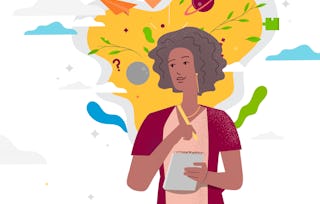In a recent study of about 0.4 million individuals across 71 countries, it was found that close to 27 percent of people globally face mental health problems, and stress is said to be a major contributor to such problems. In India, the percentage is close to 30 percent. Surprisingly, more people in the UK, Australia, South Africa, and Brazil face mental distress than in India.
6 days left! Gain next-level skills with Coursera Plus for $199 (regularly $399). Save now.

您将学到什么
Understand the concept of automaticity, the causes of our unhappiness and ways to cultivate a mindset for a happy living.
Understand mindfulness and explore the art of harmony-based thinking and regulating our emotions by practicing mindfulness techniques.
Understand the idea of authentic (moral) living and the ways to find meaning at work and in our relationships.
Identify lessons from the Indian wisdom storehouses - the Upanishads, the Bhagavad Gita, and the Yogasutras about happiness and meaningful life.
您将获得的技能
要了解的详细信息

添加到您的领英档案
34 项作业
了解顶级公司的员工如何掌握热门技能

该课程共有8个模块
In this module, you will learn about the reality of our times: The Happiness Paradox. This module highlights the importance of understanding the truth of our existence: Unsatisfactoriness and Stress. It presents before us some startling facts about the mental health pandemic that is raging in the modern human world and how stress and mental health issues are not just limited to adults but also impact young children. You will be introduced to some of the key challenges faced when living and interacting with others in the present-day world and some of the root causes for these challenges.
涵盖的内容
17个视频6篇阅读材料4个作业
This module will focus on the idea of automaticity – doing things in autopilot mode, and without careful thinking. By building on ideas borrowed from evolutionary psychology and neuroscience, the module will introduce you to the impact evolution has had on our development – especially of brains. Next, we will discuss the 'Default Mode Network’ – an aspect of our brains that has been identified as the central contributor to automaticity and unhappiness. Finally, the module will conclude and provide us with the first principle of HEAL that should be remembered as well as practiced in our lives.
涵盖的内容
15个视频4篇阅读材料4个作业
This module focuses on providing you with insights about our brain and our physiology. The module exposes you to the mind-body connection, and you will get to know how the mind impacts your body. The module then introduces you to the ideas of mindfulness and meditation. Providing evidence from biology, genetics, psychology, and neuroscience, the module will provide you an understanding of the impact of mindfulness and meditation on gene expression, aging, and stress-coping response. The module will provide you with step-by-step guidance for doing meditation at your home.
涵盖的内容
15个视频7篇阅读材料4个作业
In this module, you will learn about the idea of the ‘oneness’ mindset. The module will introduce you to the idea of our two ways of thinking and also the two selves: the ego-self and the natural-self. Building evidence from neuroscience, psychology, and philosophy, you will learn about the interconnection of the ego-self with the survival tendency that is ingrained in humans. On the other hand, the natural self is connected to the lofty ideal of practicing ‘oneness’ thinking in daily life. Last, the module showcases how oneness has been conceptualized and presented in the Indian wisdom traditions.
涵盖的内容
15个视频5篇阅读材料5个作业
In this module, you will learn about the characteristics of the first element of HEAL – harmony. The module introduces you to the characteristics of compassion and loving-kindness, their relationships with oneness mindset and the ways in which both of these qualities can be developed. By providing evidence from neuroscience as well as psychology research about the impact of consciously developing harmonious thoughts on mental health, stress-coping and happiness. Overall, the module presents the third HEAL principle of practicing oneness thinking and building harmony.
涵盖的内容
15个视频5篇阅读材料4个作业
This module will focus on providing you with a deep understanding of emotions, the brain parts and your physiology that gets involved/activated due to emotions. The module will provide you an understanding of how emotions are a consequence of the default mode network that we learnt in module two. Next, by building on insights from cognitive behavioral therapy, mindfulness based cognitive therapy, neuroscience as well as psychology research, the module provides insight into emotion regulation techniques such as open monitoring, decentering, reappraisal, checking rumination and cognitive reactivity.
涵盖的内容
17个视频6篇阅读材料4个作业
This module introduces you to the core values that are in alignment with the oneness mindset discussed in module four of the course. The module provides insights into different aspects of authentic living and showcases evidence from research that links authentic living to happiness, better mental health and reduced stress. The module then introduces you to the idea of character strengths and through the VIA survey provides you a detailed understanding of your strengths. The module then provides you tips into how you can plan/recreate your life in order to be more aligned with your character strengths.
涵盖的内容
16个视频4篇阅读材料4个作业
This module introduces you to the second aspect of authentic living – giving voice to your values. The module focuses on the aspect of modern-day living: meaningfulness at work and developing sustainable relationships. The module first provides inputs on meaningfulness of work and presents the idea of loving what you do and of loving what you do. Next, the module discusses the aspect of building sustainable relationships through ‘making time’. The module then provides examples of moral living from the lives of famous Indian heroes, Patanjali, Krishna and Buddha. Last, the module summarizes the HEAL principles presented in the course.
涵盖的内容
21个视频7篇阅读材料5个作业
位教师

从 Leadership and Management 浏览更多内容
 状态:免费试用
状态:免费试用Arizona State University
 状态:免费试用
状态:免费试用American Psychological Association
 状态:预览
状态:预览Universiteit Leiden
 状态:预览
状态:预览
人们为什么选择 Coursera 来帮助自己实现职业发展




学生评论
17 条评论
- 5 stars
88.23%
- 4 stars
5.88%
- 3 stars
5.88%
- 2 stars
0%
- 1 star
0%
显示 3/17 个
已于 Jan 16, 2026审阅
Thank you! I learned so much and experienced so many synchronicities. I adore the workbook and will continue these practices.
常见问题
To access the course materials, assignments and to earn a Certificate, you will need to purchase the Certificate experience when you enroll in a course. You can try a Free Trial instead, or apply for Financial Aid. The course may offer 'Full Course, No Certificate' instead. This option lets you see all course materials, submit required assessments, and get a final grade. This also means that you will not be able to purchase a Certificate experience.
When you purchase a Certificate you get access to all course materials, including graded assignments. Upon completing the course, your electronic Certificate will be added to your Accomplishments page - from there, you can print your Certificate or add it to your LinkedIn profile.
Yes. In select learning programs, you can apply for financial aid or a scholarship if you can’t afford the enrollment fee. If fin aid or scholarship is available for your learning program selection, you’ll find a link to apply on the description page.
更多问题
提供助学金,






